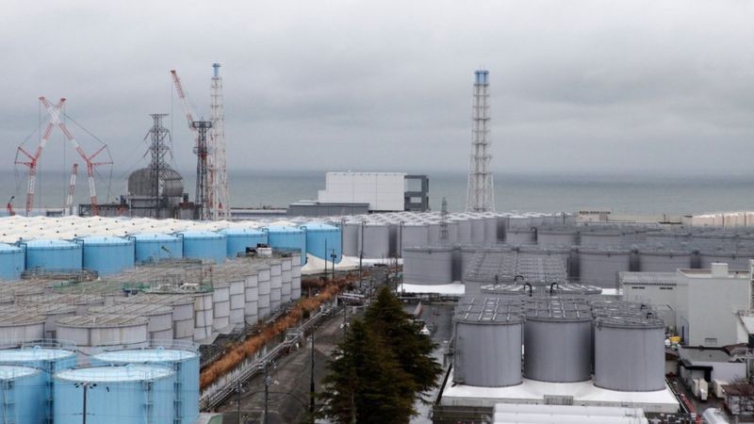Contaminated water from Japan's Fukushima nuclear plant contains a radioactive substance that has the potential to damage human DNA, a report by Greenpeace says.
The claim from the environmental campaign group follows media reports suggesting the government plans to release the water into the ocean.
Many scientists say the risk is low but some environmentalists oppose the idea.
Contaminated water from Japan's Fukushima nuclear plant could damage human DNA, Greenpeace says https://t.co/1Cwu0TYHXR
— BBC News (World) (@BBCWorld) October 23, 2020
The government has not yet responded to the Greenpeace report.
For years Japan has debated over what to do with the more than a million tonnes of water used to cool the power station, which went into meltdown in 2011 after being hit by a massive tsunami.
Space to store the liquid - which includes groundwater and rain that seeps daily into the plant - will fill up by 2022.
The government says most of the radioactive isotopes have been removed using a complex filtration process but one isotope, tritium, cannot be removed.
Last week Japanese media reported that the government had decided to start releasing the water into the sea from 2022. Under the reported plans, the water would be diluted inside the plant first in a process that would take several decades.
In its report Stemming the tide 2020: The reality of the Fukushima radioactive water crisis released on Friday, Greenpeace claimed the contaminated water contained "dangerous levels of carbon-14", a radioactive substance that it says has the "potential to damage human DNA".
The group accused the government of suggesting the water was "treated" giving the impression it "only contains tritium".
The government said no decision had been made, but observers think one could be announced by the end of the month.
Environmental groups have long expressed their opposition to releasing the water into the ocean. And fishing groups have argued against it, saying consumers will refuse to buy produce from the region.
However some scientists say the water would quickly be diluted in the vastness of the Pacific Ocean, and that tritium poses a low risk to human and animal health.
Latest Stories
-
Fish processors call for intervention against illegal trawling activities
2 minutes -
Ghana will take time to recover – Akorfa Edjeani
34 minutes -
Boakye Agyarko urges reforms to revitalise NPP after election defeat
53 minutes -
Finance Minister skips mini-budget presentation for third time
53 minutes -
‘ORAL’ team to work gratis – Ablakwa
1 hour -
Affirmative Action Coalition condemns lack of gender quotas in Transition, anti-corruption teams
1 hour -
December 7 election was a battle for the ‘soul of Ghana’ against NPP – Fifi Kwetey
1 hour -
Social media buzzing ahead of Black Sherif’s ‘Zaama Disco’ on December 21
1 hour -
Afenyo-Markin still suffering from the massive defeat – Fifi Kwetey
2 hours -
Retain Afenyo-Markin as NPP leader, he has experience – Deputy Speaker
2 hours -
Kufuor didn’t leave behind a strong economy – Fifi Kwetey
2 hours -
It won’t be business as usual, remain humble – Fifi Kwetey to party members
3 hours -
Ebenezer Ahumah Djietror appointed as new Clerk to Parliament
3 hours -
Actress Benyiwaa of ‘Efiewura’ TV series dead
4 hours -
Ashanti Regional Chief Imam dies at age 74
4 hours

